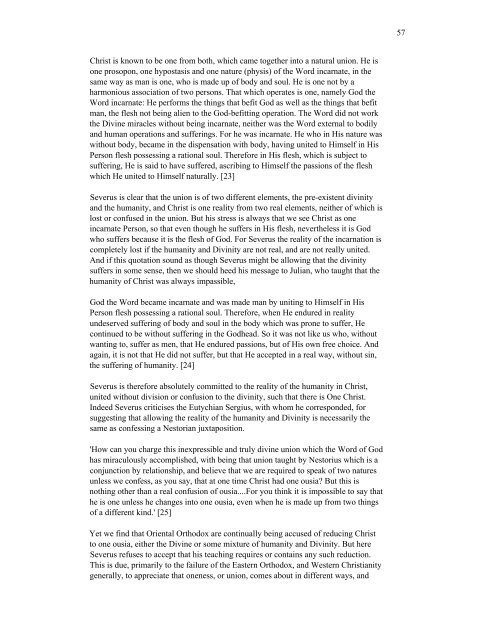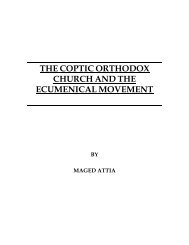Coptic interpretations of the Fourth Ecumenical Council - Saint Mina ...
Coptic interpretations of the Fourth Ecumenical Council - Saint Mina ...
Coptic interpretations of the Fourth Ecumenical Council - Saint Mina ...
Create successful ePaper yourself
Turn your PDF publications into a flip-book with our unique Google optimized e-Paper software.
Christ is known to be one from both, which came toge<strong>the</strong>r into a natural union. He is<br />
one prosopon, one hypostasis and one nature (physis) <strong>of</strong> <strong>the</strong> Word incarnate, in <strong>the</strong><br />
same way as man is one, who is made up <strong>of</strong> body and soul. He is one not by a<br />
harmonious association <strong>of</strong> two persons. That which operates is one, namely God <strong>the</strong><br />
Word incarnate: He performs <strong>the</strong> things that befit God as well as <strong>the</strong> things that befit<br />
man, <strong>the</strong> flesh not being alien to <strong>the</strong> God-befitting operation. The Word did not work<br />
<strong>the</strong> Divine miracles without being incarnate, nei<strong>the</strong>r was <strong>the</strong> Word external to bodily<br />
and human operations and sufferings. For he was incarnate. He who in His nature was<br />
without body, became in <strong>the</strong> dispensation with body, having united to Himself in His<br />
Person flesh possessing a rational soul. Therefore in His flesh, which is subject to<br />
suffering, He is said to have suffered, ascribing to Himself <strong>the</strong> passions <strong>of</strong> <strong>the</strong> flesh<br />
which He united to Himself naturally. [23]<br />
Severus is clear that <strong>the</strong> union is <strong>of</strong> two different elements, <strong>the</strong> pre-existent divinity<br />
and <strong>the</strong> humanity, and Christ is one reality from two real elements, nei<strong>the</strong>r <strong>of</strong> which is<br />
lost or confused in <strong>the</strong> union. But his stress is always that we see Christ as one<br />
incarnate Person, so that even though he suffers in His flesh, never<strong>the</strong>less it is God<br />
who suffers because it is <strong>the</strong> flesh <strong>of</strong> God. For Severus <strong>the</strong> reality <strong>of</strong> <strong>the</strong> incarnation is<br />
completely lost if <strong>the</strong> humanity and Divinity are not real, and are not really united.<br />
And if this quotation sound as though Severus might be allowing that <strong>the</strong> divinity<br />
suffers in some sense, <strong>the</strong>n we should heed his message to Julian, who taught that <strong>the</strong><br />
humanity <strong>of</strong> Christ was always impassible,<br />
God <strong>the</strong> Word became incarnate and was made man by uniting to Himself in His<br />
Person flesh possessing a rational soul. Therefore, when He endured in reality<br />
undeserved suffering <strong>of</strong> body and soul in <strong>the</strong> body which was prone to suffer, He<br />
continued to be without suffering in <strong>the</strong> Godhead. So it was not like us who, without<br />
wanting to, suffer as men, that He endured passions, but <strong>of</strong> His own free choice. And<br />
again, it is not that He did not suffer, but that He accepted in a real way, without sin,<br />
<strong>the</strong> suffering <strong>of</strong> humanity. [24]<br />
Severus is <strong>the</strong>refore absolutely committed to <strong>the</strong> reality <strong>of</strong> <strong>the</strong> humanity in Christ,<br />
united without division or confusion to <strong>the</strong> divinity, such that <strong>the</strong>re is One Christ.<br />
Indeed Severus criticises <strong>the</strong> Eutychian Sergius, with whom he corresponded, for<br />
suggesting that allowing <strong>the</strong> reality <strong>of</strong> <strong>the</strong> humanity and Divinity is necessarily <strong>the</strong><br />
same as confessing a Nestorian juxtaposition.<br />
'How can you charge this inexpressible and truly divine union which <strong>the</strong> Word <strong>of</strong> God<br />
has miraculously accomplished, with being that union taught by Nestorius which is a<br />
conjunction by relationship, and believe that we are required to speak <strong>of</strong> two natures<br />
unless we confess, as you say, that at one time Christ had one ousia? But this is<br />
nothing o<strong>the</strong>r than a real confusion <strong>of</strong> ousia....For you think it is impossible to say that<br />
he is one unless he changes into one ousia, even when he is made up from two things<br />
<strong>of</strong> a different kind.' [25]<br />
Yet we find that Oriental Orthodox are continually being accused <strong>of</strong> reducing Christ<br />
to one ousia, ei<strong>the</strong>r <strong>the</strong> Divine or some mixture <strong>of</strong> humanity and Divinity. But here<br />
Severus refuses to accept that his teaching requires or contains any such reduction.<br />
This is due, primarily to <strong>the</strong> failure <strong>of</strong> <strong>the</strong> Eastern Orthodox, and Western Christianity<br />
generally, to appreciate that oneness, or union, comes about in different ways, and<br />
57








